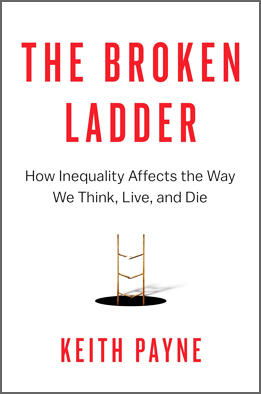|
The Broken
Ladder: How Inequality Affects the Way We Think, Live, and
Die
by Keith
Payne
c.2017, Viking
$28.00 / $37.00 Canada
246 pages
Terri Schlichenmeyer
The Truth Contributor
He got more.
There was a time in your life when just noticing that was
reason to throw a tantrum. It was enough to make any adult
near you want to run away. But now that you’re all grown up,
“He got more” means more – and in the new book The
Broken Ladder by Keith Payne, you’ll see how it
might affect your life.
|
 |
|
Airplane kerfuffles are hardly news these days, but Keith
Payne sees them differently: they are, he says, linked to
status hierarchy. First-Class has wider, plusher seats while
coach fliers must cram themselves into tiny cushions and
share an armrest. Whether they know it or not, that causes
envy. In fact, air rage increases, say researchers, when
people are forced to see this inequality. Add a delayed or
canceled flight, and things escalate to violence.
The thing is that flights aren’t cheap. Just the fact that
someone is on a plane says a lot about their income but when
people perceive inequality, they “feel poor
and act poor, even when they’re not.” Even so, it’s
true that the rich do get richer, while the poorest people
have treaded financial water for about the last
half-century.
Payne imagines a ladder as a metaphor for inequality. The
higher the rung an individual reaches, the better their
status and income, health, safety and future. Racial
inequality – which is “qualitatively different,” no matter
how big a person’s paycheck is – affects one’s position on
the ladder. So does geography, and education, or lack
thereof. The lower the rung, the less the person has,
monetarily and otherwise.
The good thing is that each person’s situation may change
within parameters, and can be relative to that of others:
the Haves, in other words, think they have not… until they
see that the Have Nots have less. That changes perceptions
and may, at least temporarily, lead to a more satisfied
life. Even so, in the incessant effort to get ahead, an
individual’s needs (or imagined needs) can cause
risk-taking, and the accompanying adrenaline rush affects
body organs negatively.
Simply put: inequality can kill you. And if you’re on a
lower rung of that imaginary ladder, even your death will be
unequal.
Oh, my, but the first three-fifths of The Broken Ladder
is an eye-opener. In those pages, author Keith Payne sets
readers up with a plethora of statistics to support what
he’s about to lay down; specifically, that inequality is
worse than we think it is.
Once the point is made, however, the last of this book is
quite repetitive. It’s filled with the commonsensical, a
rehashing of brain science with which audiences for this
book are likely familiar, stereotyping, and frequent
comparisons to our simian relatives, ending with a Kumbaya
that really just barely matches the books’ original tone.
Heavy sigh.
And yet – in this world of widening class gaps, how could
you miss the important first chapters here? You can’t,
that’s all, because every little bit helps understand it and
with The Broken Ladder, you get more.
|